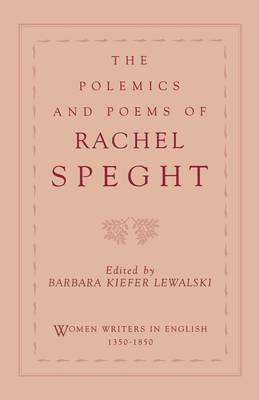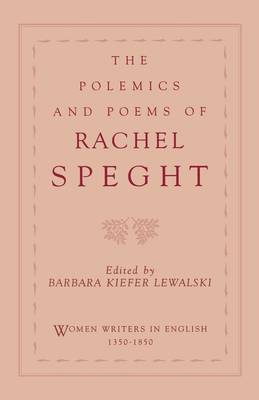
Je cadeautjes zeker op tijd in huis hebben voor de feestdagen? Kom langs in onze winkels en vind het perfecte geschenk!
- Afhalen na 1 uur in een winkel met voorraad
- Gratis thuislevering in België vanaf € 30
- Ruim aanbod met 7 miljoen producten
Je cadeautjes zeker op tijd in huis hebben voor de feestdagen? Kom langs in onze winkels en vind het perfecte geschenk!
- Afhalen na 1 uur in een winkel met voorraad
- Gratis thuislevering in België vanaf € 30
- Ruim aanbod met 7 miljoen producten
Zoeken
Omschrijving
Rachel Speght was the first Englishwoman to identify herself, unmistakably and by name, as a polemicist and critic of contemporary gender ideology. This edition includes her foray into the Jacobean gender wars and her collected poems. Speght's tract, A Mouzell for Melastomus (1617), is at once a spirited answer to Joseph Swetnam's attack on women and a serious effort to stake women's claim to the prevailing Protestant discourse of biblical exegesis, in order to define a more expansive and more equitable concept of gender. Speght's volume of poems, Mortalities Memorandum with a Dreame Prefixed (1621)--printed, in part, to counter charges that her prose was actually her father's--includes a long memento mori meditation and an allegorical dream vision that recounts her own rapturous encounter with learning. Both texts vigorously defend women's education and promote women's talents. This latest addition to the Women Writers in English series should find a ready audience among scholars and students of early seventeenth-century literature, history, and religion, as well as among those in women's studies.
Specificaties
Betrokkenen
- Auteur(s):
- Uitgeverij:
Inhoud
- Aantal bladzijden:
- 144
- Taal:
- Engels
- Reeks:
Eigenschappen
- Productcode (EAN):
- 9780195086157
- Verschijningsdatum:
- 20/06/1996
- Uitvoering:
- Paperback
- Formaat:
- Trade paperback (VS)
- Afmetingen:
- 139 mm x 207 mm
- Gewicht:
- 136 g

Alleen bij Standaard Boekhandel
+ 298 punten op je klantenkaart van Standaard Boekhandel
Beoordelingen
We publiceren alleen reviews die voldoen aan de voorwaarden voor reviews. Bekijk onze voorwaarden voor reviews.









